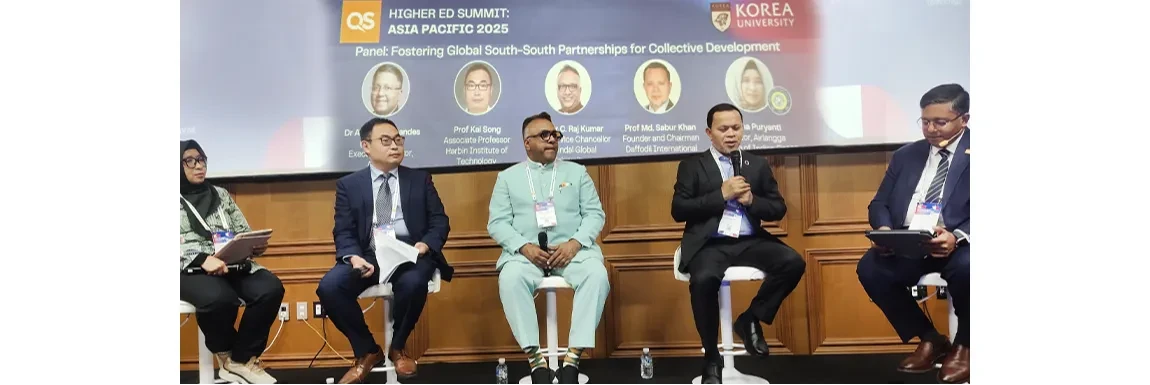Daffodil International University Chairman Advocates for Global South Partnerships at QS Higher Ed Summit in Seoul

Dr. Md. Sabur Khan, Chairman of the Board of Trustees of Daffodil International University (DIU) is delivering his speech at the QS Higher Ed Summit: Asia Pacific 2025, held at Korea University, Seoul, South Korea, from 4–6 November 2025.
SEOUL, South Korea – [Date of Release] – Dr. Md. Sabur Khan, Founder and Chairman of Daffodil International University (DIU) and President of the Association of Private Universities of Bangladesh (APUB), delivered a compelling vision for Global South-South collaboration as a featured speaker at the QS Higher Ed Summit: Asia Pacific 2025. The panel discussion, titled “Fostering Global South-South Partnerships for Collective Development,” was hosted by Korea University from November 4-6, 2025. The session explored how universities in the Global South can transcend traditional donor-recipient models to build equitable, reciprocal alliances rooted in shared innovation and cultural strength. Dr. Khan emphasized the need to reposition higher education as a form of soft power and a catalyst for sustainable development.
From Knowledge Consumers to Innovation Producers
A central theme of Dr. Khan’s address was the urgent need for Global South institutions to transition from being knowledge consumers to innovation producers. “At Daffodil International University, we have built a multi-layered ecosystem where students launch ventures, not just complete degrees,” Dr. Khan stated. “Our Capstone Projects are aligned with the UN Sustainable Development Goals, transforming final-year projects into real businesses. This is not theory; this is South-South development in action.”
A Concrete Framework for Collaboration
Dr. Khan outlined a practical, action-oriented framework for partnership, built on four key pillars:
1. Technological Sovereignty: Highlighting DIU’s AI-driven personalized education ecosystem and in-house digital platforms like GoEdu and Skill.jobs, which foster digital self-reliance.
2. Embedded Entrepreneurship Ecosystem: Showcasing DIU’s Department of Innovation & Entrepreneurship—the first of its kind in South Asia—which has generated over 200 startups directly from classroom projects.
3. Reciprocity and Mutual Growth: Emphasizing partnerships that treat all institutions as knowledge producers. Dr. Khan cited DIU’s “Jeebika” rural entrepreneurship model, a replicable framework now being studied by universities in Nigeria, Indonesia, and Cambodia.
4. Global South IP and Startup Corridor: Proposing the creation of a “Global South IP Bank” to facilitate patent-sharing, cross-border incubation, and the commercialization of student and faculty innovations across regions.
Announcing DIU’s Commitments: From Vision to Action
To translate dialogue into tangible outcomes, Dr. Khan announced three key commitments from DIU for the next 12 months:
1. Launch of the “Global South Employability Fellowship”: Offering 50+ hybrid fellowships for students from Asia, Africa, and Latin America to co-develop solutions using DIU’s platforms.
2. Establishment of a “Global South Research Lab”: A shared lab focused on AI for education and climate-smart innovations, open for joint research and IP-sharing.
3. Activation of the DIU Dubai Campus as a Global Exchange Hub: Launching an “Innovation Semester Abroad” program to serve as a nexus for co-creation and learning for students across the Global South.
“The youth are not the future—they are the present. But they need tools, trust, and territory to grow,” Dr. Khan remarked. “Our collective goal must be to move beyond MOUs to co-funded, co-created, and co-governed initiatives. Let’s walk together—from Global South to Global Strength.”
The QS Higher Ed Summit: Asia Pacific is a premier gathering of university leaders, policymakers, and education experts, providing a critical platform for shaping the future of higher education in the region.
About Daffodil International University (DIU)
Daffodil International University is one of the leading private universities in Bangladesh, renowned for its strong emphasis on innovation, entrepreneurship, and technology. With a commitment to creating “confident, connected changemakers,” DIU has built a comprehensive ecosystem that includes a venture capital arm (BVCL), incubation centers, and a global network of academic partnerships. The university is consistently ranked highly for its impact and is a vocal advocate for the digital transformation of education in the Global South.


